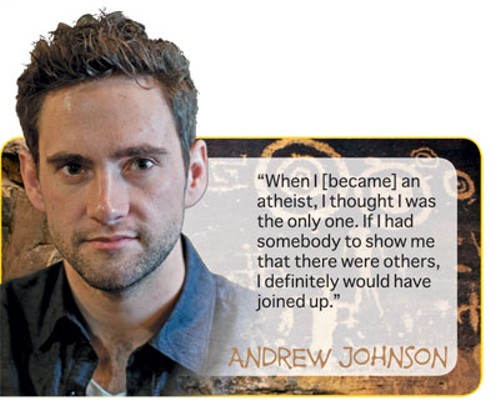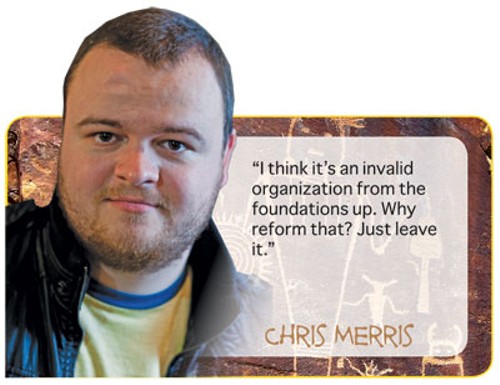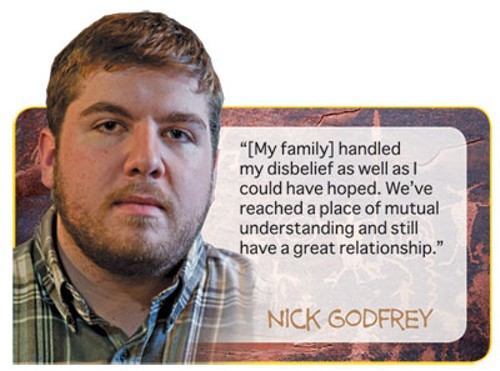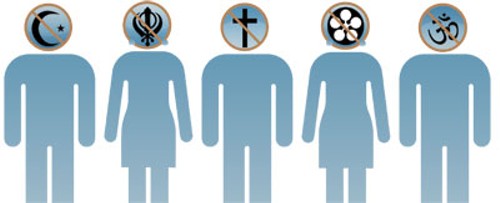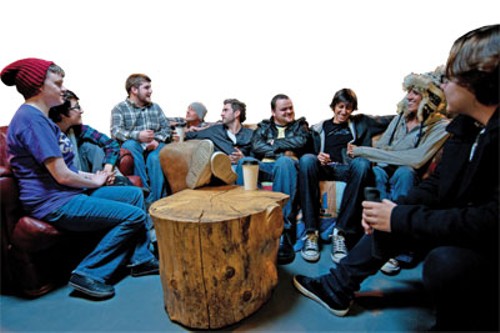A Mormon missionary who loses his faith while out in the field has picked a strange time to abandon his beliefs. Yet, for Andrew Johnson, this is precisely what happened.
Johnson says he started doubting Mormonism when he was 18, but out of a desire to please his family, and still not knowing who he was, he turned in his mission papers and set out to serve an LDS mission. While 18 months out, however, he was exposed to contraband by a secular humanist, stuff like the movie Religulous and Richard Dawkins’ book The God Delusion. Johnson says the exposure opened his mind to new possibilities.
“I remember having a distinct moment where I was like, ‘There is no God,’ and that was a liberating moment,” Johnson says. “I tried to do the rest of my mission without being too much of a hypocrite.”
After his mission, Johnson “did the whole returned-missionary thing for about a month, and felt really bad about it because my family paid for my mission. They had this big banner on my house when I got home, and I thought, ‘Crap, how am I going to tell them?’”
Johnson, who says he’s usually been the sort of person guided by logic, felt like he couldn’t keep going, pretending he was a believer, and resolved to share his disbelief with his family. Doing so, of course, wasn’t going to be easy.
Despite the difficulty, Johnson mustered the courage to divulge his revelation to his parents. The response wasn’t well received at first, especially by Johnson’s disappointed mother. But after a while, he says, things calmed down. And that’s when he discovered a support group of sorts for former Mormons-turned-atheists in Salt Lake City.
After attending a few meetings, Johnson, a Lindon resident, realized he couldn’t be alone in his religious skepticism, even in Utah Valley, and decided that a group could be formed closer to home. With help from others, Johnson formed the Atheists of Utah Valley, a group where other like-minded individuals could convene and support each other. Meeting over coffee in Provo, they’ll plan group discussions and occasionally have guest speakers, or they’ll plot group activities like hiking trips or even sky-diving jaunts. They’ve talked about joining the Adopt A Highway program and lobbying the Utah Valley University library to stay open on Sundays, as well.
According to Johnson, such a group is of vital importance in a religiously charged environment like Utah Valley. Those who leave the Mormon religion often don’t know where to turn, and can quickly be overcome with feelings of desperation.
“When I [became] an atheist, I thought I was the only one,” Johnson says. “If I had somebody to show me that there were others, I definitely would have joined up.”
A LARGER TREND?
It’s common for young adults to become disinterested in religion and pursue their own goals and interests, and this increasing “spiritual disengagement” is drawing the attention of researchers. A 2010 article in Christianity Today, citing various studies, says that the percentage of Americans claiming “no religion” doubled in about two decades, up from 8.1 percent in 1990 to 15 percent in 2008. A substantial 22 percent of 18- to 29-year-olds claimed no religion, up from 11 percent in 1990. Also, 73 percent of these younger people came from religious homes.
The same article makes reference to the research of Robert Putnam and David E. Campbell, authors of a 2010 study called “American Grace: How Religion Divides and Unites Us,” which shows that the younger generation is dropping out of religion at five to six times the historic rate. The trends are starting to draw the attention of religious sociologists and leaders, with some attributing the pattern to the aforementioned normal breakaway that youth embark on. But more and more are wondering if, generally speaking, religious influence is simply holding less sway on the younger generation.
The Christianity Today article concludes by suggesting that religious groups, in order to stop the emigration from their rolls, need to “undertake the slow but fruitful work of building relationships with those who have left the faith.” Yet, building these relationships may prove difficult for those who find irreconcilable differences between their true beliefs and the teachings of their former church.
FALLING AWAY
For former LDS missionary Chris Merris, a BYU graduate, the idea of forging a new relationship with a church he no longer believes in isn’t plausible. In fact, he says he resents those who try to instigate that sort of reconciliation and those who try to change the church while remaining members.
“I think I have more problems with those who stick around in it and want to reform it, as if it’s some sort of democratic thing,” Merris says. “There’s this whole movement, like ‘New Order Mormons,’ for people who have become intellectually disenchanted with the church, but they still want to be a part of it. But it’s an invalid organization from the foundations up. Why reform that? Just leave it.”
Merris found out about Johnson’s group after reading an article about it in The Daily Utah Chronicle, the University of Utah student newspaper. The idea of atheists in Utah Valley, where he lives, piqued his interest, and he decided to check it out.
“They’re like the nicest group of people that I think I’ve ever met in Provo,” Merris says of the Atheists of Utah Valley. “Very welcoming, very open.”
Merris’ own falling away, like Johnson’s, began on his mission. Serving in nearby Ogden, he began getting into books of deep doctrine at the library, exploring controversial issues about the Mormon faith that weren’t necessarily church-approved. This eventually led him to anti-Mormon literature. One book he came across, One Nation Under Gods: A History of the Mormon Church, shook him up so badly that he had to consult with his mission’s zone leader.
“I was like, ‘Yeah, I don’t know, man, some of the stuff made sense,’” Merris recalls. “And he’s like, ‘Well, I had the same experience, and so I have a question for you. How did you feel when you were reading these things?’ And I was like, ‘I didn’t feel really good.’ Then he’s like, ‘Well, then you know it wasn’t of God.’ It made enough sense to me at the time—making sense obviously having nothing to do with reality.”
Certain heavy-handed practices required by his mission also made Merris feel uneasy about his religion. He says that he and other missionaries were encouraged to go beyond the normal missionary discussions with prospective new members, implementing such things as what they called the “Joseph Smith pray now.” This involved getting missionaries and prospective new members to pray in a circle about the reality of Joseph Smith’s status as a seer, and then, after the missionaries testified about feeling the spirit, asking the prospective new members to share their feelings. He says that such methods amounted to manipulation and put pressure on both the missionaries and non-members involved.
“We psychologically manipulated people—it was very clear,” Merris says. “Now that I’ve read about psychological experiments and look at them in that context, I’m like, ‘Yeah, we were clearly manipulating those people.’”
Even after these mission experiences, Merris continued his participation in the LDS Church, eventually coming face to face with the next logical step for a returned missionary—temple marriage. While dating one girl, Merris says his crisis of faith returned due to issues with the idea of revelation.
“I had a revelation that I was supposed to marry a girl, then I had a revelation that I was not supposed to marry her, within a couple weeks of each other,” Merris says.
Well-meaning family members tried to help him, suggesting that one of these revelations was inspired while the other was not. Merris, however, did not find these suggestions helpful.
“Looking back on it, it was ridiculous,” he says.
After these events, it wasn’t too long before Merris’ mind, which still couldn’t make sense out of much of the church’s doctrine and history, eventually gave up trying to justify and rationalize his faith. In going through this process, Merris says he realized the connection to religion is hard to break mostly because of emotional connections.
“I think I’ve known logically it’s not true for a long time,” Merris says. “But it’s still the emotional attachment that’s there. You have so many neural networks built up around it, it’s in the background, and I still feel like I have some of that stuff underlying.”
Merris believes this realization can only come after the fact, when one leaves their faith behind. Even as he believes he manipulated people, he believes he was manipulated, leaving him without the necessary skills, at the time, to leave the church.
“I think I couldn’t see problems before because I didn’t have the right critical-thinking tools,” Merris says. Ultimately, Merris says, logic and critical thinking made him realize that he could no longer be a participating member of his church.
A SHIFTING WORLDVIEW
For former missionary and Atheists of Utah Valley group member Nick Godfrey, similar problems with the church were fundamental to his loss of faith.
Doubts began to circle in Godfrey’s mind about one year after he returned home from his LDS mission. Frustrations with the church culture and its rules regarding morality, which he found confusing, led to disillusionment. One day, in a moment of introspection, Godfrey allowed himself to consider the possibility that the Mormon church wasn’t true.
“In that moment, my entire worldview shifted,” Godfrey says. “Everything that had ever troubled me about the church suddenly made sense. I no longer had to square evolution with the story of Adam and Eve that I had to take literally as a Mormon. I no longer had to play mental gymnastics trying to justify the belief that God made the priesthood conditional on race, or that the Book of Abraham papyrus translated incorrectly, or that the story in the Book of Mormon is contradicted by archeology, linguistics, genetics and pretty much every other scientific field.”
It was an interesting time for Godfrey to be questioning his beliefs, as he had an assignment to go speaking in the wards in his stake about his missionary experiences, had a teaching calling and was a veil worker at the temple. After six weeks, spurred by discovering the online community PostMormon.org, Godfrey talked with his parents and explained to them his issues with the church. Even though his parents are devout Mormons, Godfrey says, they have been accepting of his departure from the church.
“They have handled my disbelief as well as I could have hoped,” he says. “We’ve reached a place of mutual understanding and still have a great relationship.”
Godfrey is lucky in this regard. For most people, talking to their family members about their lack of belief is something that is too intense or painful. And for Atheists of Utah Valley group members who attend BYU, being open with their families is usually not a viable option, as they could either lose their ecclesiastical endorsement or lose money from their parents. “While attending BYU, it’s better to kind of keep them in the dark,” says one student who wanted to remain anonymous for fear of how her family would react. “I’m not afraid of what they’ll think, it’s purely for money reasons—just scared of the money going away.”
What concerns Johnson most about this is that it illustrates a problematic, conditional acceptance within families. The idea that one’s relationship to their parents should be so tenuous, depending on whether one believes in God or not, is unsettling to him.
“I think it’s a little indicative of our relationship to our parents that the [LDS] Church puts more importance on being a member and believing in God than the actual family itself, “Johnson says. “That’s what scared me, thinking that my parents would think of me second to their religion. I think that’s what scares a lot of members. They’re scared of losing their family.”
A BATTLE OF CONSCIENCE
Bruce Harr’s move to atheism had less to do with finding the church to be lacking than it did with his general well-being. Growing up in an LDS family, Harr was taught that praying, bearing testimony and fasting would lead to a confirmation of the truth of the church.
“Unfortunately, this never happened,” Harr says.
After first leaving the church, Harr moved in with a family who was very active in the church and started attending once again. He received his Duty to God award, given to young Mormon men who complete certain priesthood, became an Eagle Scout and served a mission, earning high marks from his mission president.
His frustrations with the church resurfaced, however, after returning home. Despite trying to fight off secular temptations by immersing himself in his ward’s choir and throwing away all his R-rated movies, the world of sin beckoned Harr. The ensuing battle of conscience proved to be a huge obstacle in his life.
“It seemed the harder I tried, the worse it was for me,” Harr says. “One bishop expressed his discouragement to me by telling me that he hated seeing me back in his office every week. I stopped attending church at that point and resolved to figure my stuff out before I went back.”
Not long after again quitting attending church, Harr’s father died in a car crash, several months after having revealed to Harr his own doubts about Mormon theology. In order to deal with the grief, Harr sought out a therapist. Although LDS, the therapist helped Harr see that many of his problems and frustrations emanated from the pressures he felt his religion was heaping on him. This counsel led Harr to question the legitimacy of the institution he had followed most of his life, leading to a re-evaluation of all that he once believed.
“This kind of opened my mind to the fact that the church may not be the end-all authority on all subjects,” Harr says. “My opinions on things like homosexuality, the word of wisdom, the death penalty, guilt, the value of faith and the source of morality started to change.”
Though this process opened Harr’s mind to new possibilites, it was also painful to finally leave the religion that he had invested so much time into and that was an important part of his family.
“On the one hand, I felt relief from the oppression of the church, and on the other hand, I was stressed and unhappy at my ‘outcast’ state from my community,” he says.
For relief, Harr began attending a group in Salt Lake called Jack Mormons. To see former Mormons who were well-adjusted surprised Harr, as he’d been taught differently.
“I met several other post-Mormon people who seemed happy and functional despite the negative image I had had of those who left the church,” Harr says. “My perception of people who left the church was that they were miserable and sinners and always bitter.”
It was at this group that Harr learned about the Atheists of Utah Valley. After visiting them, things began to get better and Harr’s adjustment to life without God settled in.
“My life started to change dramatically,” he says. “I was social again, I had friends and I started getting out of my house to do things.”
The next step was one that proves difficult for many Mormons-turned-atheists—telling his family. Harr began this process by dropping hints via Facebook and being more vocal about his new liberal outlook. As his postings on Facebook became more direct, so did the concern of his family members. Although his mother has been supportive, others in his family have not.
“My sister moved out of my house when I left the church because she ‘needed a more positive environment,’” Harr says. “My extended family has responded in a variety of ways, everything from condemnation to complete support and understanding to being asked not to come to family functions anymore.”
Despite the fallout, Harr does not regret leaving his church.
“It has definitely been a roller-coaster ride,” he says. “But I’m glad I’ve come out and am finally able to live my life the way I want to, and not the way the church wants me to.”
FINDING A NEW PATH
Groups for atheists, especially former-Mormon atheists, are found all over the state. Many of them are assisted by UCOR, the Utah Coalition of Reason, the group responsible for billboards with messages like “Don’t believe in God? You are not alone.”
Nascent groups like the Atheists of Utah Valley can use as much support as they can get, according to Johnson, who says the need to connect and engage in meaningful activities with other people who have left religion behind is important, considering how difficult it can be for individuals to make a leap away from their churches, families and lifelong support systems.
“A lot of people have come and actually told me that they’ve felt some kind of desperation or dismalness, and once the group had been started and they could come to meetings and express their feelings and have a better experience socially, their life has improved,” Johnson says.
Diego Ibanez [Editor's note: this name is a correction; an incorrect name appeared in the print edition], an organizer of the group, says it helps people realize what Harr felt after attending a post-Mormon group, that “it’s OK to be happy as an atheist,” and that members learn that they “can be comfortable being atheist in a society that doesn’t tolerate that or doesn’t like having us here.”
“I feel like what we’re trying to do and express is being a voice for people like that, specifically in Utah, because if they ever need a voice, it’s in Utah.”
Godfrey quickly learned that simply displaying one’s status as an atheist can lead to hostile reactions in Utah.
“This summer, I put a bumper sticker on my car which simply read ‘Atheist,’” he says. “It was torn off in less than a week. A couple weeks later, I bought a similar sticker, which I put on my car along with a Human Rights Campaign sticker. They were also torn off in less than a week.”
Leaving the LDS church, especially for returned missionaries, doesn’t always make sense to their families and others, and as Ibanez points out, many still don’t take the decision very seriously.
“One of the things we face is that if you don’t go to church, you must be dumb, you must not understand life, you don’t know what you’re doing,” Ibanez says. “That’s something that pushes a lot of us to further understand what it means to be atheist and try to imagine what a secular society looks like.”%uFFFD
More by Greg Wilcox
-
Greatest Snow On Earth... But For How Long?
How climate change is affecting our state motto—and a billion dollar winter recreation industry.
- Feb 5, 2020
-
Still Great?
Decreasing water levels threaten the Great Salt Lake’s future.
- May 8, 2019
-
Ransom Wydner of Operation Voltron
Local musicians cover Christmas tunes for The Road Home
- Dec 23, 2014
- More »
Latest in Cover Story
Readers also liked…
-
Forget the family pedigree—Robert F. Kennedy Jr should not be the next president of the United States
Trojan Horse
- Jun 21, 2023
-
Women decry harassment and toxic culture at St. George auto dealership
Men at Work
- Oct 11, 2023



